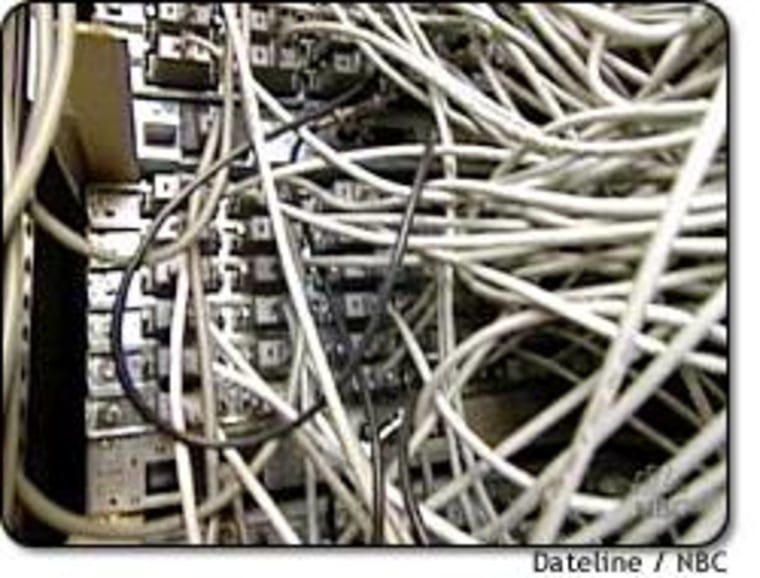Even though most of us deplore the unwanted telephone calls that disrupt the dinner hour seemingly every night, somebody must be buying, because telemarketing is big business.
Most of us have experienced it — a telephone call just as dinner is served. When you answer, instead of hearing the voice of a friend or colleague you’re greeted by a telemarketer’s sales pitch for a property time-share or yet another credit card.
Not everybody hangs up. In 2001, telephone solicitations generated $660 billion in revenue, up from about $435 billion in 1990, according to the Federal Communications Commission.
And profit margins are high. According to the Direct Marketing Association, a trade group, sales of goods and services through telemarketing generated $274 billion in profits in 2001.
It takes an enormous number of unsolicited calls to generate those kind of numbers — some 104 million daily, or about one per household, according to the trade group. But costs are low thanks to a relatively new technology called the predictive dialer, which turns the business of dialing over to an automated system. The computer dials numbers in a database, using a mathematical algorithm to determine when a live telemarketer will be finished with one sales call and ready to start another, minimizing the lag time between sales calls and improving productivity.
The dialer is supposed to transfer the call to the sales representative once the person called answers, but the computer doesn’t always manage to pull off the synergistic effect, so consumers sometimes hear a click and no one on the other end of the telephone line.
It was the rise of the automated dialing system that sparked growing outrage that eventually led the FCC to create the National Do Not Call Registry.
Telemarketers are required to buy the list from the government and are banned from calling numbers on the list three months after consumers register.
Industry executives, who opposed creation of the list, say it will eliminate thousands of jobs just as the economy is struggling to get back on its feet.
Most telephone sales pitches are made on behalf of legitimate organizations, but some are out-and-out fraud. Congress estimates that telemarketing scams defraud consumers to the tune of more than $40 billion a year, with fraudulent telemarketers directing the vast majority of their sales calls towards older Americans.
These interruptions have provoked the ire of American consumers and their complaints have led the Federal Trade Commission to propose the creation of a national “do-not-call” list — a register of households that do not want to receive telephone sales calls from telemarketers, supplementing similar lists created by a majority of U.S. states.
Prior to establishment of the national list, consumers had to rely on a crazy quilt of methods to insulate themselves from annoying telephone intrusions.
Some telephone companies offer their own blocking and screening solutions, like Verizon’s Caller ID and SBC’s Privacy Manager. For a fee, these services intercept calls from callers and require them to identify themselves. Users can then decide whether to accept or refuse a call.
Another solution, a $40 device called the Telezapper, plays a tone that makes the predictive dialer’s computer think your line has been disconnected. Other services, like Phone Butler and The Screen Machine, play a message telling telemarketers that you do not accept sales calls.
The services worked well enough, but telemarketers have found ways to circumvent them, according to Robert Bulmash, president and founder of Private Citizen, an Illinois-based group dedicated to fighting intrusive marketing techniques.
Some telemarketers send a false telephone number with their calls so they won’t be immediately ignored, Bulmash said. And some manufacturers of telemarketing equipment are reconfiguring their equipment so it ignores the SIT tones used by the Telezapper.
For consumers who are still bothered by calls, Bulmash recommends using “behavioral” techniques.
Tell your phone company you don’t want them to sell your information when you get a new number, he counsels. And don’t list your real name and number in the phone book, he adds, as compilers of reverse directories use the information to market products to you. Instead, Bulmash advises listing your first and middle names.
But the best way to block telemarketers is to know your rights, according to Bulmash. He recommends consumers memorize a particular phrase and deliver it when telemarketers call.
“Never hang up on a telemarketer without saying at least the following: ’Please put me on your ‘do-not-call’ list. Share my request with all affiliates. Send me a written copy of your do-not-call policy,’ ” Bulmash said. Under existing decade-old rules governing telemarketing, consumers can request that telemarketers place their name and number on a “do-not-call” list and keep that information in their databases for 10 years.
